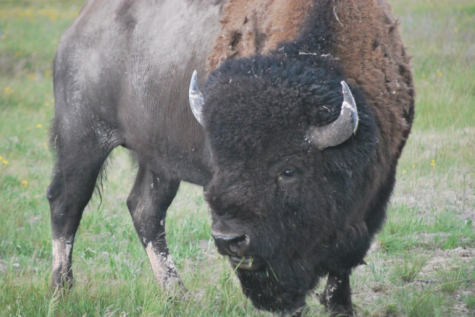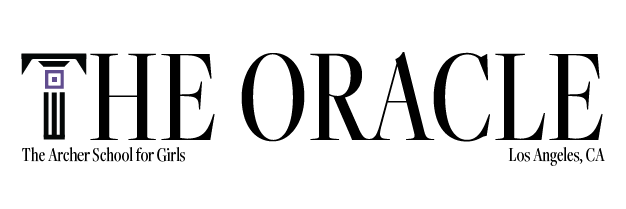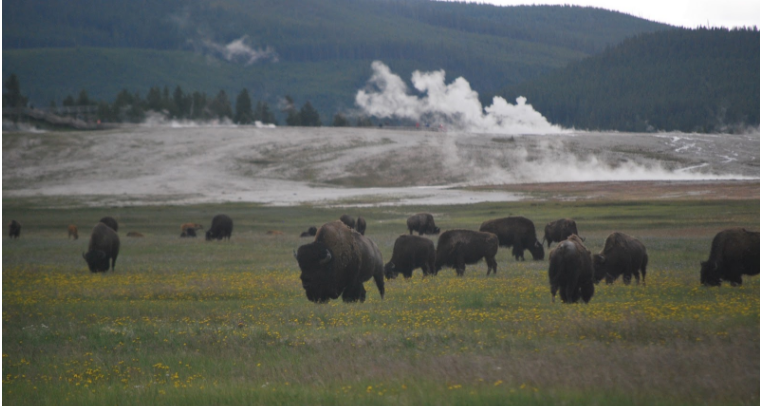Photo credit: Sammy Torres
A herd of American Bison at Yellowstone Stone National Park. For thousands of years before Yellowstone became a national park, Native Americans used the region to hunt, fish, gather plants, and quarry obsidian.
Column: Decolonizing our Minds – a Reflection on American Thanksgiving
December 3, 2017
This column is part of a series written by teacher guest writers on a topic they are interested in exploring. This was submitted to The Oracle for review by the Editorial Board.
I give thanks to my ancestors today and everyday. Those ancestors who survived and resisted the largest genocidal period in human history. Those ancestors that struggled generationally in the wake of a global defining politics and economy forged out of the legacy of the Doctrine of Discovery – a centuries old papal-initiated declaration morphed into legal cover for theft, wars of conquest and settler colonialism. America is not a new world, but an ancient land, initially inhabited and cultivated by millions of indigenous peoples for millennia, before being brutally displaced to fragmented reservations and economic devastation through a myriad of unhonored treaties.
Contrary to conventional U.S. historical narratives so often perpetuated by cultural and educational institutions, the settler colonialist context of American history is an essential recognition in avoiding the lazy mythological assumption of manifest destiny. These commonly taught narratives reinforce misrepresentations of the “first Thanksgiving,” as well as propaganda and stereotypes that work to portray indigenous American inhabitants as savage and subhuman. These justifications of settler colonialism avoid fundamental questions about the formation of the United States and the implicit connections to its present and future.

A male mature American Bison at Yellowstone National Park. Historically, Native Americans used thermal waters in the park for religious and medicinal purposes.
Originally declared a day of “thanksgiving and praise” by President Abraham Lincoln amid the Civil War, the precedent setting proclamation was a powerful and sweeping call for unity and gratitude for the “blessings of fruitful fields and healthful skies.” Yet, despite the call for humble penitence for the misgivings of this nation to the “sufferers in the lamentable civil strife in which we are unavoidably engaged,” not a single word is mentioned regarding the atrocities brought about by settler colonialism and the subsequent land theft and extermination practices toward indigenous peoples. Rather, Lincoln echoes the ghosts of the Doctrine of Discovery by reflecting instead on the “gracious gifts of the most high God,” neglecting to reference their acquisition through genocidal policy, robbery and murder.
Amid the frenzy of seasonal traditions of American Thanksgiving lies a misleading and pernicious theme implying a virtuous “first encounter” that serves to “honor” a national origin narrative that blatantly misrepresents the fundamental historical reality of indigenous eradication.
The Pilgrims that arrived at Plymouth Rock in 1621 received more than a meal from the native Wampanoag people. According to Jacqueline Keeler, “[The Pilgrims] were poor and hungry — half of them died within a few months from disease and hunger… The native people fed them through the winter and taught them how to grow food.” A treaty was signed on this “first” thanksgiving granting the Pilgrims right to occupy indigenous territory that they were squatting on. Within twenty years, the Wampanoag people would be decimated, as would millions more in the following decades due to genocidal policies of forced removal and extermination.
Easily one of America’s favorite holidays of the year, Thanksgiving as a national icon has evolved into a time of family reunions, feasting, parades and the recently accelerated hyper-consumption season brought about by “holiday shopping.” For years, my family has observed the holiday like most. In the morning, preparations of a turkey-centric spread are made amid the backdrop of the Macy’s Thanksgiving Day Parade broadcast. A prayer of gratitude and hope precedes the family feast, where catching up on life events and the inevitability of braving the realm of politics take center stage, despite football on TV in the background.
In recent years, not too much has changed. Although, we’ve made considerable shifts in our attention to the subtle details. Uninspired, we were compelled to shut off the parade broadcast shortly after the hosts introduced the iconicized “Tom Turkey” and Pilgrim escort. Not surprisingly, their narration neglected to even recognize the presence of the indigenous people who had been invaded on during this “first feast.”
This year, we spent considerable time reflecting on the nefarious origins of these narratives and even utilized this theme to make connections to current world events — crises related to DACA, Haitian refugees, climate change and the Trump Administration’s decision to shrink protected native lands. Additionally, we committed to scaling down our footprint on the holiday gift giving season by focusing on meaningful experiential gestures. An obvious aversion from the chaos of Black Friday.
What does that legacy of settler colonialism mean for us now, in light of these oft-neglected historical perspectives?
“An Indigenous People’s History of the United States” author, Roxanne Dunbar-Ortiz, reminds us that “while living persons are not responsible for what their ancestors did, they are responsible for the society in which they live in, which is a product of that past. Assuming this responsibility provides a means of survival and liberation.”
By recognizing the survivance of indigenous people we do not simply provoke accusation but offer an integral acknowledgement of historical reality.
“We’re certainly not against giving thanks,” Mahtowin Munro, co-leader of the United American Indians of New England, said in an interview with The Final Call. “The issue here with the Thanksgiving holiday as celebrated in the United States is that it perpetuates this myth that the wonderful Pilgrims came here from Europe and were so kind and good to the Native people, who were here, and lived happily ever after.”
Kandi Mossett of the Indigenous Environmental Network gave a keynote speech last month at the annual Bioneers conference.
“We have a responsibility to protect life,” Mossett said. “We are strong, and we are smart. And we know that we can do things like decolonize our own minds.”
Similarly, UCLA professor and historian Juan Gomez-Quiñones argues that this transformation needs to begin with education. While I certainly remember studying Native American history in school, much of it was tokenized and deemed supplementary to the overall theme of American manifest destiny. We ought to be critical of approaches like this and demand a shift toward full integration of indigenous perspectives in academic curricula from kindergarten through graduate school.
Utilizing education as a springboard to awareness and collective action, Dunbar-Ortiz suggests that the process to restoration and repatriation must include honoring treaties the United States made with indigenous nations. We must restore sacred sites, starting with the Black Hills in South Dakota, and reconstruct and expand Native nations.
Through this process, our continent might be productively transformed physically and psychologically. Admittedly, the struggle appears daunting. However, this shift has the potential to radically transform a worldview based out of conquest, toward one based out of healing, responsibility and sustainability.
Torres’ column represents an abbreviated summary of his comprehensive essay, which can be found here.

